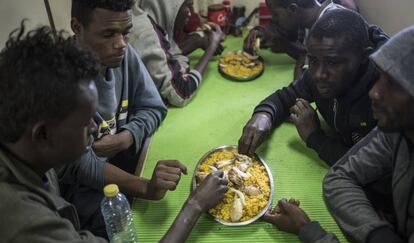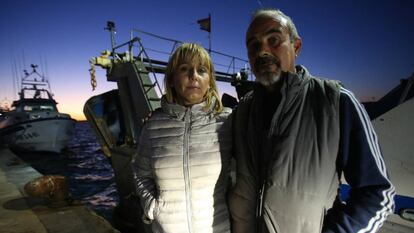Malta says Spain will accept migrants rescued by fishing vessel near Libya
Maltese authorities agreed to take the 12 people on board but only as a temporary measure for “humanitarian reasons”

Spain will accept at least 11 of the 12 migrants rescued several weeks ago by the Spanish fishing vessel Nuestra Madre Loreto off the coast of Libya, according to Maltese authorities. The migrants were rescued by the fishermen while fleeing the Libyan Coast Guard on a rubber dinghy. Three of them scrambled on board while another eight threw themselves into the water and were picked up by the ship.
Malta did not have an obligation to take them in because they were not rescued in Maltese waters and Malta was not the closest port
At the time of the rescue, Spanish Prime Minister Pedro Sánchez claimed that the migrants should be returned to Libya as it was the nearest point and therefore the safest. Humanitarian organizations, including the UN’s Refugee Agency UNHCR, criticized Spain’s decision to leave the migrants’ fate in the hands of Libya, which is known to auction off and torture migrants.
Pascual Durá, the fisherman in charge of the ship, was also concerned about the danger and set course instead for Spain on Saturday.
“[The migrants] are fleeing from these barbarities. They jumped into the water precisely because they were trying to escape the Libyan [Coast Guard]. Also it could be dangerous for us because if they realize we are getting closer, they could stage a mutiny,” explains Durá from a satellite phone on his boat.
On the way back to Spain, the 29-year-old was informed that Malta had given the ship authorization to bring the migrants to shore. The deal included the 12th migrant, who was brought to Malta last Friday for health problems.
We couldn’t leave them there. It was our duty to rescue them. I won’t leave anyone to drown in front of me
Malta’s interior minister and head of national security, Kurt Farrugia, told Reuters this was a temporary solution for “humanitarian reasons.”
According to Farrugia, the rescued migrants will be taken to Spain once they receive medical attention and recover. “Malta did not have an obligation to take them in because they were not rescued in Maltese waters and Malta was not the closest port,” said Farrugia in a message on Twitter.
When asked about the situation on Sunday morning, Spain’s Deputy Prime Minister Carmen Calvo did not want to provide any information on the conditions of the negotiations or confirm whether or not Spain would accept the migrants.
Malta refused to opens its ports until the very last minute and it was not until midnight on Sunday that Nuestra Madre Loreto was given authorization. The ship, however, was not allowed to dock in Malta but was instead met by another boat 12 miles off the coast, said Durá.
The Spanish fishing family that refused to look the other way

"They threw themselves into the water, they were desperate to flee the Libyan patrol. We couldn't leave them there. It was our duty to rescue them. I won't leave anyone to drown in front of me," says Pascual Durá. Unsure how to handle the dramatic situation, Durá called his boss and father José Durá and they decided it was best not to move the boat "because the propeller could suck them in."
In 2006, his father rescued 51 migrants and another 26 in 2007. Almost 100 migrants have been rescued by the family from Santa Pola in Alicante.
Pascual is a keen supporter of the conservative Popular Party (PP) and was on the group's electoral list in Santa Pola. But he disagrees with the party's theory that rescuing migrants creates a so-called "magnet effect" that encourages more people to make the dangerous journey.
"Governments of whatever nation should be worried about their own people but also about human rights. Here neither of these things has been addressed," says Pascual.
His father agrees: "Countries have to agree to a protocol but they should first imagine what it would be like if they had a car accident, they were bleeding and lots of cars were passing by, looking at them and driving on. You have to put yourself in these people's shoes."
Despite the language barrier, Pascual understood that the migrants did not want to be handed over to Libya. "One boy made a huge impact on me. He climbed onto the boat, raised his arms, celebrating that he had escaped then fell like a sack to the floor. They were destroyed," he explains. The boy was evacuated by helicopter with convulsions to a hospital in Malta.
When asked whether he would do it again, Pascual doesn't think twice: "Of course," comes his reply.
English version by Melissa Kitson.
Tu suscripción se está usando en otro dispositivo
¿Quieres añadir otro usuario a tu suscripción?
Si continúas leyendo en este dispositivo, no se podrá leer en el otro.
FlechaTu suscripción se está usando en otro dispositivo y solo puedes acceder a EL PAÍS desde un dispositivo a la vez.
Si quieres compartir tu cuenta, cambia tu suscripción a la modalidad Premium, así podrás añadir otro usuario. Cada uno accederá con su propia cuenta de email, lo que os permitirá personalizar vuestra experiencia en EL PAÍS.
¿Tienes una suscripción de empresa? Accede aquí para contratar más cuentas.
En el caso de no saber quién está usando tu cuenta, te recomendamos cambiar tu contraseña aquí.
Si decides continuar compartiendo tu cuenta, este mensaje se mostrará en tu dispositivo y en el de la otra persona que está usando tu cuenta de forma indefinida, afectando a tu experiencia de lectura. Puedes consultar aquí los términos y condiciones de la suscripción digital.









































